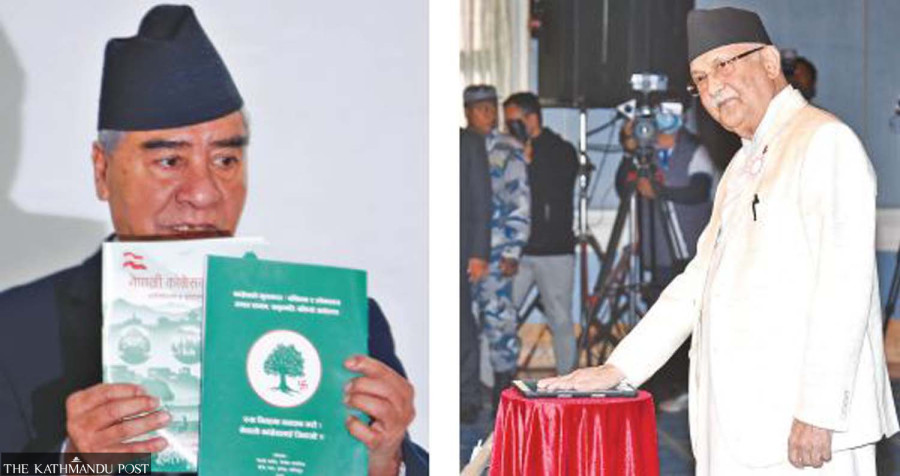Money
Election manifestos promise the moon as political parties jockey for position
The declarations have become a mere ritual with little relevance, economists say.
Pawan Pandey
With polling day closing in fast, the major political parties are rushing with their election manifestos.
On Saturday, the Nepali Congress made public its list of things to do. And on Monday, the Communist Party of Nepal (Maoist Centre), Communist Party of Nepal (Unified Socialist) and Rastriya Prajatantra Party issued their policies and programmes.
The Communist Party of Nepal (Unified Marxist Leninist) released its election manifesto on Tuesday.
The election manifestos as usual contain promises of sky-high economic growth and job creation by the millions. Economists say the declarations have become a mere ritual with little relevance.
All the parties have proclaimed that they will make Nepal self-reliant in the production of fruits, vegetables, fish, meat, milk and spices in the next five years.
The Nepali Congress has targeted an annual economic growth rate of 7 percent. The CPN-UML has aimed for a similarly dizzy growth trajectory in the initial phase. But in the next five years, its target is double-digit growth, no less, just like the Maoists.
On the tourism front, the Nepali Congress has pledged to bring 2 million foreign tourists annually. The CPN-UML has upped the ante to 2.5 million arrivals. The highest number of tourist arrivals in Nepal's history is 1.2 million.
The Congress aims to increase tourist spending to $100 daily, and boost the contribution of tourism to the gross domestic product to 5 percent.
The parties have also announced grand plans to increase jobs. While Congress intends to create 250,000 jobs every year, the Maoist Centre and the UML have promised to create 400,000 and 500,000 jobs respectively.
Economists have scoffed at the figures. It is estimated that more than 80 percent of the 500,000 youths who enter the labour market every year opt for foreign employment. And this number is rising every year.
Migrant worker departures hit a five-year high in the last fiscal year ended mid-July 2022. Congress president Sher Bahadur Deuba was sworn in as prime minister at the same time.
According to the Department of Foreign Employment, 637,113 labour permits–new and re-entry–were issued for foreign employment in the last fiscal year.
“The government’s target is to generate 500,000 jobs throughout the country in a year,” said Loknath Bhusal, under-secretary at the Prime Minister Employment Programme under the Labour Ministry.
“Out of this number, 200,000 jobs will be created through the Prime Minister Employment Programme, and the rest through other programmes conducted by other ministries and the private sector.”
The acute job shortage in the country was starkly revealed when more than 700,000 unemployed individuals registered for the programme in the last fiscal year. The wage-employment scheme launched in 2018-19 has been a letdown.
According to reports, local units deployed the jobseekers hired under the scheme to do trivial work like rearing stray animals and gardening, among other similar tasks.
In the last fiscal year, Rs12 billion was allocated for the scheme, which provided 75 days of work on average to 163,142 individuals, government statistics show.
The budget for the scheme, which aims to provide employment to 200,000 individuals this fiscal year, has been slashed to Rs7.05 billion.
Economist Jagadish Chandra Pokharel says the promises of job creation made by the parties may be difficult to fulfil but not impossible.
“This will require a systemic approach and more reforms in the financial sector. It is not something that can be achieved through the efforts of a single political party in government,” said Pokharel.
“The creation of jobs is directly linked to investment which depends on the private sector. It is not difficult if we can ensure an investment-friendly environment.”
Pokharel added that the challenge would be to offer decent jobs amid the availability of better opportunities in foreign countries.
“The problem is that the parties are least concerned about their manifestos after the election,” said Pokharel.
Mahabir Pun, chairperson of the National Innovation Centre, a non-profit committed to promoting technological research and innovation in Nepal for the past decade, says reading the election manifestos is a waste of time.
“I have never read such commitment papers. They are full of big promises which are not fulfilled,” said Pun.
“Investment in research and innovation is essential for promoting business enterprises which leads to economic growth and creation of jobs,” Pun said. “None of the parties or the governments they have formed has ever taken up this issue seriously.”
Economist Pokharel believes the election manifesto of a single political party has become irrelevant.
“The election manifestos are necessary because the parties need to promise something to the people in return for their votes,” said Pokharel. “It is also the basis on which the voters can question the leaders regarding previous commitments, their fulfilment and present agenda.”
But Pokharel says the manifestos have become irrelevant because the parties have formed electoral alliances. “Joint manifestos would have better served the purpose.”
Despite making deals to field joint candidates, the parties in the electoral alliances have issued separate manifestos.
Experts say the parties have promised populist schemes which will strain the state coffers. The Nepali Congress has vowed to reduce the minimum age for the old-age allowance to 65 from 68 years.
Uddhab Pyakurel, a political analyst, told the Post that election manifestos had become ritualistic.
“The problem lies in the implementation of the commitments,” Pyakurel said. “As the voters too don’t seem to care much about the promises, the parties have turned it into a ritual.”




 8.79°C Kathmandu
8.79°C Kathmandu














